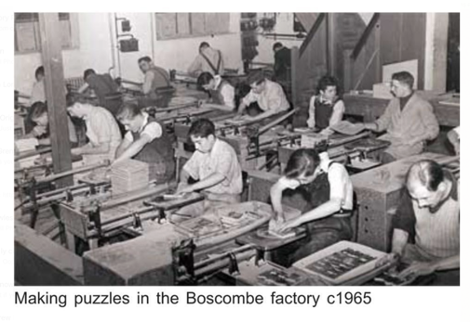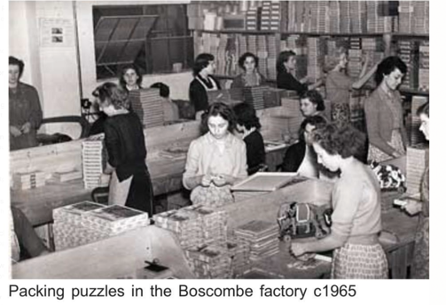A History of Victory
Gerald Hayter, founder of the Victory brand, pictured sitting.
The Victory Jigsaw Puzzles brand was first established in the early 1920s by G.J. Hayter & Co. in Bournemouth, England. The wooden jigsaws were a familiar sight in British homes from the 1920s onwards. They were cut by hand from plywood and covered a wide range of subjects, including maps, famous landmarks, planes, ships, trains and well known paintings. Some, such as their best selling jigsaw of Queen Elizabeth’s coronation in 1953, had a patriotic theme; in fact the trademark ‘Victory’ had been chosen after the celebrations marking the end of the First World War. Victory puzzles were known to be a favourite with the Royal family.
In the early 2020s, during the coronavirus pandemic, we became jigsaw puzzle enthusiasts and searched out vintage puzzles which led to our discovery of the Victory brand. Now, as owners of Victory Wooden Puzzles Ltd, it has been our honour and privilege to re-establish this historic 100 year old brand.
Using sustainably sourced wood and ink products combined with modern laser cutting techniques, our puzzles contain beautiful cut patterns which include the whimsical shaped pieces that Victory was so famed for.
Distributing out of our premises less than 10 miles from the site of the original factory, we work closely with established and emerging artists and continue to bring you original, beautiful images to give you the most fantastic puzzling experience.
Continued below...
Explore Our History


Gerald Hayter was born into a Dorset farming family in 1901. His fascination with an oval 100-piece wooden puzzle acquired just before the First World War, encouraged him to buy a fretsaw to cut his own puzzles. On leaving school Gerald became a junior bank clerk earning £1 per week. In order to supplement his income, he produced and sold his wooden jigsaw puzzles and as a celebration to mark the end of the Great War, he decided on the brand name, Victory. His output gradually increased and by 1924, when he married, he was spending many hours in his garden shed which he used as a workshop.
Throughout the 1920s Gerald continued to work in the bank while developing his jigsaw business. As Victory grew, the garden shed was replaced by a small rented workshop in Oxford Road, Bournemouth where his wife supervised production. The Victory works was tucked in beside the railway station with no possibility for expansion and so, in 1931, Victory moved to Palmerston Road, Boscombe, a far more suitable site which became the company’s permanent home.
Victory grew rapidly during the 1930s. The company was a regular exhibitor at the British Industries Fair and Victory proudly noted that, at the 1937 fair, Queen Mary purchased twelve copies of each of the three special coronation puzzles - designed to commemorate the coronation of George VI and his wife Elizabeth that same year.
The publicity materials of the 1930s give some idea of the company’s marketing and promotional strategy and its perception of what was important. Interlocking pieces and ‘whimsies’ were mentioned as enhancing the attractiveness of the puzzles. Victory's ‘Super Cut’ puzzles were especially challenging puzzles with up to 2,000 pieces and featured colour line cutting. Boxed in gold with no guide pictures, their cutting pattern was unlike previous Victory designs and included lots of whimsical shaped pieces and sometimes a wavy perimeter edge.
By the outbreak of the Second World War, Victory had about thirty different series of puzzles on offer. Like all producers during the war, the company suffered the loss of skilled labour and the shortage of materials. Despite these difficulties, Victory soldiered on and at the end of the war, after a period of considerable austerity, the Coronation of Elizabeth II was an impetus for new and exciting puzzles. Victory produced many puzzles depicting the Queen, the Duke of Edinburgh, the Coronation Coach, and soldiers and guards on Royal duties.
At the peak of its production in the 1950s, Victory employed over one hundred staff, including fifty scroll saw artisans. During the 1960s, with the interest in jigsaws waning and with less expensive, good quality cardboard alternatives available, the wooden jigsaw market declined and the company was eventually sold in 1970 to the well-known family firm of toy makers, J.W. Spear & Sons of Enfield. Victory puzzles stopped being produced in the late 1980s and have since become highly collectable heirlooms.
Fast Forward to the 2020s - during the coronavirus pandemic, with people forced to remain at home, the interest in jigsaw puzzles exploded. Andrew Knowles, whilst living in Boulder, Colorado discovered beautifully designed, laser cut wooden puzzles produced by a local manufacturer.
With a background in fine art materials (his family founded Daler-Rowney) and having worked in the art and craft materials industry for most of his life, Andrew, hungry for a new venture, started to research the wooden jigsaw puzzles market. In a moment of serendipity, he discovered the Victory brand and was amazed and delighted to learn that it had been founded in his home town of Bournemouth, England a century earlier.
Enlisting his son Aidan (a graduate of California College of the Arts, San Francisco) and close family friends, James & Toby Martin, they re-established the historic, 100 year old, Victory brand.
If he were alive today, we would like to think that Gerald would be delighted to see his life's work and famous 20th century brand reborn. We will endeavour to honour his legacy by creating beautiful wooden puzzles for the next generation of puzzle enthusiasts in the 21st century and beyond.
Historical credit to Tom Tyler - from his book entitled British Jigsaw Puzzles of the 20th Century

